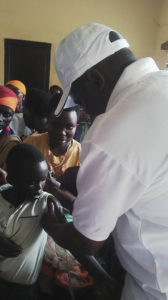Communities have positively responded to Measles-Rubella vaccine, health officials say
Health officials report Measles-Rubella vaccine campaign that started with this week has met with a positive response from communities.

Dr Ndayishimiye Vianney giving a shot of MR vaccine
Sources from the Ministry of Public Health say Measles-Rubella vaccination campaign that started on Monday is going well.
Dr Olivier Ndayizeye, Director of Expanded Programme on Immunization (PEV), says the smooth progress of the campaign is due to the fact that Burundians have a positive attitude towards vaccination at large.
“All stakeholders understand that the vaccine has a positive health impact”, he says. “That’s why the activities for the current campaign are going well and no serious problems have been observed so far anywhere in the country”, he adds.
“Vaccine-preventable diseases have seriously declined in Burundi thanks to the public positive response”, says Vianney Ndayishimiye, the Provincial Health Director of Bujumbura.
Administration of the combined injectable vaccine against Measles and Rubella (MR) started on Monday within the framework of the celebration of the seventh African week of vaccination. It purports to cover 4,176,573 children from nine months to less than 15 years old according to the Ministry of Public Health.
The vaccination campaign was initiated because case-based Measles and Rubella surveillance showed the existence of the diseases. The Ministry of Health says 381 cases of Measles and 282 others of Rubella were confirmed among 1720 suspected cases from 2008 to 2016.
The diseases were found to exist on the entire national territory, except in four health districts.
Rubella can be particularly health-threatening
Measles and Rubella are infectious and contagious diseases that spread through coughs of infected people. Some symptoms are common to both Measles and Rubella. These include rash (area of red spots on the skin of patients),cough and fever. Symptoms specific to Measles are runny nose and inflamed eyes. People infected by Rubella also feel tired and have sore throat.
Dr Ndayizeye says pregnant woman’s infection with Rubella, particularly in the first term, can cause among many other issues, birth defects affecting the brain, heart, ear and eyes.
Mothers may also give birth to stillborn babies (babies born dead) or have miscarriage. “It may be true that some miscarriages are caused by Rubella. We are not equipped enough to detect that in Burundi”, says Dr Ndayishimiye.
Rubella (also known as German measles) is caused by the Rubella virus. Measles is caused by measles virus. There is no specific treatment for the two diseases. They are preventable by vaccine.
Vaccination sites are at health centres, outreach sites and schools where the majority of the target children are. “80% of children to be vaccinated in Bujumbura province are in schools. That’s why we have deployed most of our team there”, says Dr Ndayishimiye.
He says the dedication of nurses doing the vaccination and the communities’ positive response make the activities go smoothly.
Of the 241, 062 children to be vaccinated in five days from Monday, 100,635 had been already vaccinated on Tuesday.Reports from different health districts say parents are bringing their children in huge numbers.



















 IWACU Open Data
IWACU Open Data

